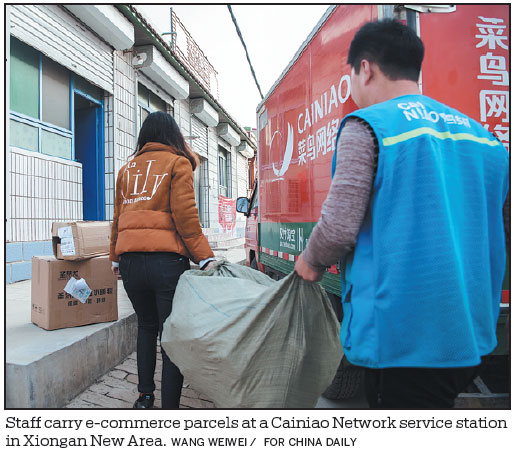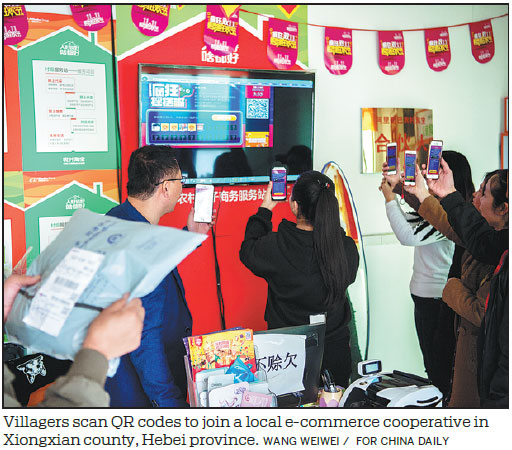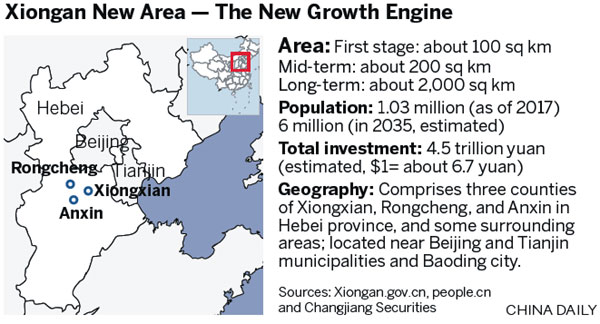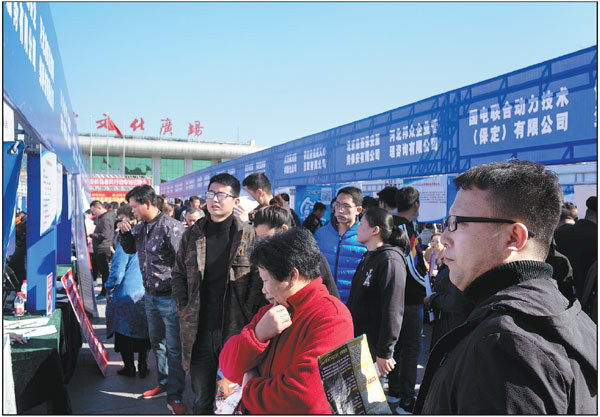Made in Xiongan, for China's e-economy
Villagers embrace e-shopping, help stoke consumption upgrade amid rising retail wave
"Made in Xiongan" - with that phrase printed on his product labels, villager Wang Ermeng, 33, has carved an e-niche for his wares, attracting an increasing number of online shoppers, and confirming the tremendous growth potential in China's rural e-commerce.
According to the Ministry of Commerce, online retail sales soared to 1.37 trillion yuan ($205 billion) in rural areas last year, up more than 30 percent year-on-year.
The emerging sector is projected to see a heady 39-percent compound annual growth rate in the five-year period beginning 2017 to reach 2.33 trillion yuan in 2021, according to Shenzhen-based consultancy OCN.
|
People from all walks of life attend a Xiongan New Area talent fair in Anxin county, Hebei province, earlier this month. The establishment of Xiongan New Area in North China's Hebei province in 2017 has helped increase the income of many natives. Provided to China Daily |


That would be almost 13 percent of the total 17.8 trillion yuan of all e-commerce in China in 2021, according to London-based consultancy eMarketer.
Small wonder, not far from Wang's base, Chinese lawmakers and top political advisers gathered earlier this month in Beijing for their annual two sessions, and promptly underlined the big role rural e-commerce can play in driving domestic consumption-led economic growth.
They called for strong measures to support rural e-commerce. That was music to Wang's ears. Like them, he and his fellow villagers in Xiongan New Area, who have embraced e-commerce in recent times, see great prospects for the sector.
"E-commerce has developed rapidly in Xiongan while some traditional manufacturing businesses have stopped or moved out due to pollution or because their low-end produce is no longer a priority in the new area," said Wang, a native of Wangjiazhai in Anxin county, Hebei province.
The establishment of Xiongan New Area in North China's Hebei province in April 2017 has helped increase the income of many natives like Wang.
Since 2016, he has been selling self-made lotus leaf tea and smoked fish on WeChat, China's all-in-one killer app. Initially, the online business helped him to pull in about 2,000 yuan a month.
After Xiongan was set up, he began distinguishing his products with "Made in Xiongan" on packaging labels. "It's like, Xiongan itself is a great brand and people are interested to have a taste of the food made in the new area," he said, adding his monthly income has since increased to more than 5,000 yuan.
Wang is expecting his online business to grow further as he believes Xiongan would be the front line for implementing new policies and measures.
During the two sessions, the China National Democratic Construction Association, also known by its Chinese abbreviation Minjian, a recognised political party in the People's Republic of China, put forward several suggestions to further develop rural e-commerce.
It called for improved services for e-commerce in rural areas. One of its suggestions was to plan logistics distribution layout reasonably and drive enterprises to improve their terminal delivery services.
In Xiongan, convenient logistics infrastructure for terminal delivery has been established in some villages. Thanks to that, Wang is now able to sell his products to consumers all over the country.
Cainiao Network, e-commerce giant Alibaba Group's logistics arm, started to establish a rural logistics network about four years ago in Xiongxian and Rongcheng, two counties now covered by Xiongan.
According to Xiong Jian, director in charge of Cainiao's rural logistics, their network has reached more than 110 villages in Xiongan New Area, and distribution vehicles drive around 700 kilometers per day to carry goods from and to the villages.
"The logistics could only reach town level in the past, which troubled villagers whenever they wanted to dispatch or fetch goods," Xiong said.
Cainiao will continue to expand in Xiongan to cover more villages in the future because consumption in the area via e-commerce platforms has grown, Xiong said.
More and more villagers, including elder people who don't know how to use mobile phones and computers, started to buy daily necessities like food and other products online. They enlist the support of professional helpers such as Wang Hongxin to execute online transactions.
As a business agent of Alibaba, Wang Hongxin, 42, a rural homemaker, helps villagers to buy or sell goods via Taobao, an e-commerce platform under Alibaba.
"They tell me what they want to buy or sell, I do it for them," she said, adding she works at a Rural Taobao Service Station at Zhangqingkou village in Xiongxian county.
The job has transformed Wang Hongxin into a busy career-driven female. She buys at least 30 items for villagers each day and the number topped 500 on Nov 11 last year, the Singles Day online shopping festival, when many products are sold online at discounts.
"Although rural consumers lag their urban counterparts, their consumption habits and ways of rural life have changed as they gradually experienced the convenience of e-commerce," said Wang Hongxin.
Her opinion is in line with China's e-commerce development trend in rural areas. Online retail sales across the country's rural areas experienced tremendous growth in 2018, according to the Ministry of Commerce.
The trend saw nearly 80 service stations being set up in different villages in Xiongan since 2015, according to Alibaba's rural Taobao departments.
JD, China's another e-commerce giant, has also extended its services to rural areas in Xiongan by setting up Jingdongbang service centers, JD's third-party centers, which provide e-commerce-related services such as buying things on villagers' behalf, sending goods to households and installing appliances.
Wang Gang, head of a Jingdongbang service center in Rongcheng county, said retail sales on JD are dealt via the center, and have soared 10 times during the past four years.
Xiongan New Area signed an agreement with Alibaba in 2017 under which the latter will provide technology and innovation resources for developing fields such as big data, smart logistics and e-commerce.
"In the warehouses of Cainiao Network, equipment like automatic operation lines, robots and mechanical arms will be used and driven by algorithms, thus improving logistics efficiency," a report on Xiongan's official WeChat account said, quoting the agreement.
"Xiongan New Area has created great opportunity for the upgrade of e-commerce, which is increasingly relying on artificial intelligence," said Zhao Zhenying, deputy head of Beijing-based SinoTsing Information Technology Academy, in an interview to Beijing Business Today.
Besides, the presence of e-commerce in Xiongan will not be limited to domestic trading.
A cross-border e-commerce comprehensive pilot zone will be encouraged to be set up in Xiongan, according to a guideline on deepening reforms and expanding opening-up in the new area, which was published in January.
The guideline said a digital trading platform with sights on the global market will be established in the area to facilitate cross-border payments and settlements.
He Wei in Shanghai contributed to this story.
Contact the writers at zhangyu1@chinadaily.com.cn

(China Daily 03/25/2019 page8)



















